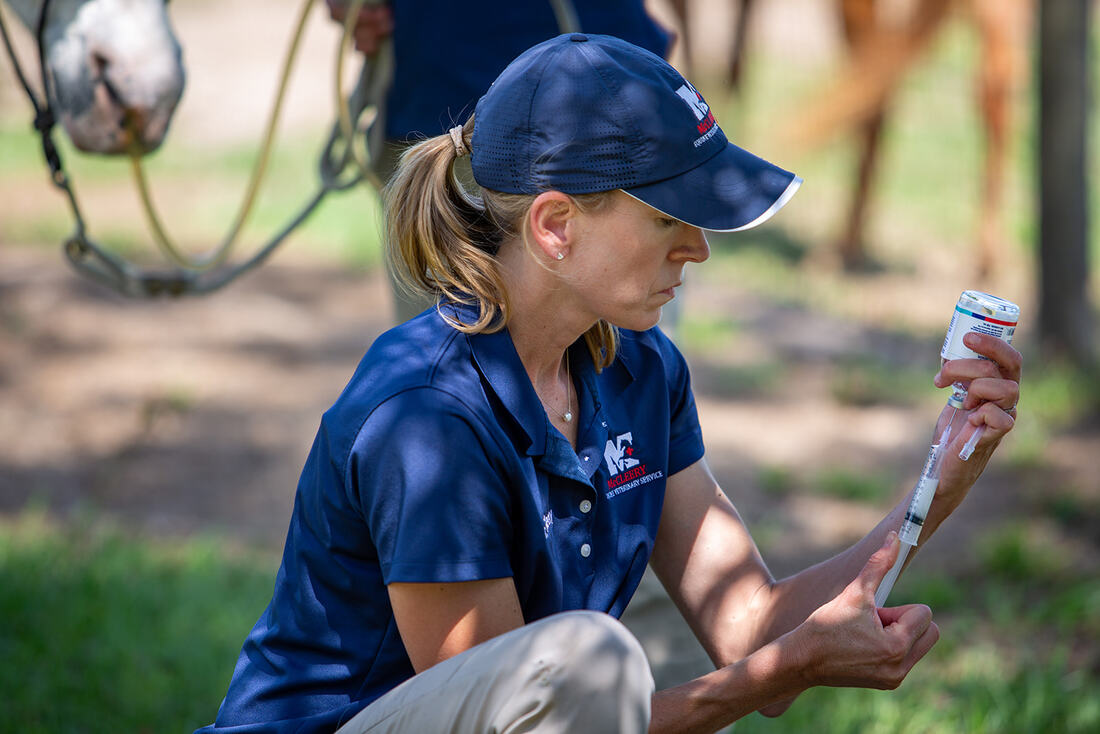Emergency Services
McCleery Equine provides emergency care for active clients 24 hours a day, 7 days a week.
If you are a regular client and you have an emergency, please call (352) 214-3875.
If you are a regular client and you have an emergency, please call (352) 214-3875.
Sometimes you may not know if a situation warrants a veterinary call, but a "wait and see" attitude can make some problems much more difficult to resolve. The lists below provide a rough guideline on when to call. Remember, if you aren't sure, call the practice! McCleery Equine will be happy to discuss your situation and help determine the best course of action.
Call Immediately if your horse has:
- A wound located over a joint, a puncture wound, or a wound that exposes bone or tendon. Even if the wound looks small and your horse isn't lame, these type of wounds can spell serious trouble. If a joint or tendon sheath has been contaminated, treatment is much more effective when instituted early.
- Colic. Your normally ravenous horse doesn't want to eat, is looking at his sides, is lying down, rolling or otherwise acting strange. Colic can range from mild gas to a life threatening problem and the treatment will vary depending on the diagnosis. An exam is essential in determining proper care.
- Choke. Your horse is suddenly gagging, extending his neck and may have food particles coming from his nostrils. Choke occurs when feed material gets stuck in the esophagus (not in the windpipe like a human "choke"). Sometimes a choke will pass within 20-30 minutes of onset, but others require veterinary assistance.
- Dystocia. Your mare is having trouble foaling. Once the birthing process has begun time is of the essence, and a delay of even a few minutes can lead to problems for the foal.
- Substantial bleeding. Sometimes any amount of blood looks like a lot (especially on a gray!), so how much is cause for concern? Horses are large animals, to give you perspective, lets think of it in terms of blood donation. Just like humans, a horse can donate up to 10% of its blood, meaning that the blood loss of just under 1.5 gallons is usually well tolerated by a healthy, average sized (1100 pound) animal. This is a large quantity of blood, but it is important to note that this much can be lost at a fast drip (too fast to count the drops) in less than 1.5 hours.
Call for a same day appointment if your horse has:
- A cut (laceration). If a wound requires sutures, the healing and infection rates are greatly decreased if veterinary care is provided within 6 hours of injury.
- A squinting, painful or swollen eye. A small scratch on a cornea can become a threat to your horse's vision without prompt care.
- A fever (temperature over 102ºF).
- Non-weight bearing lameness or founder.
- A placenta (birth membranes) that have not been passed within 3 hours of giving birth.
For guidelines on how to handle specific emergencies until the veterinarian arrives see What to do until the vet arrives.


